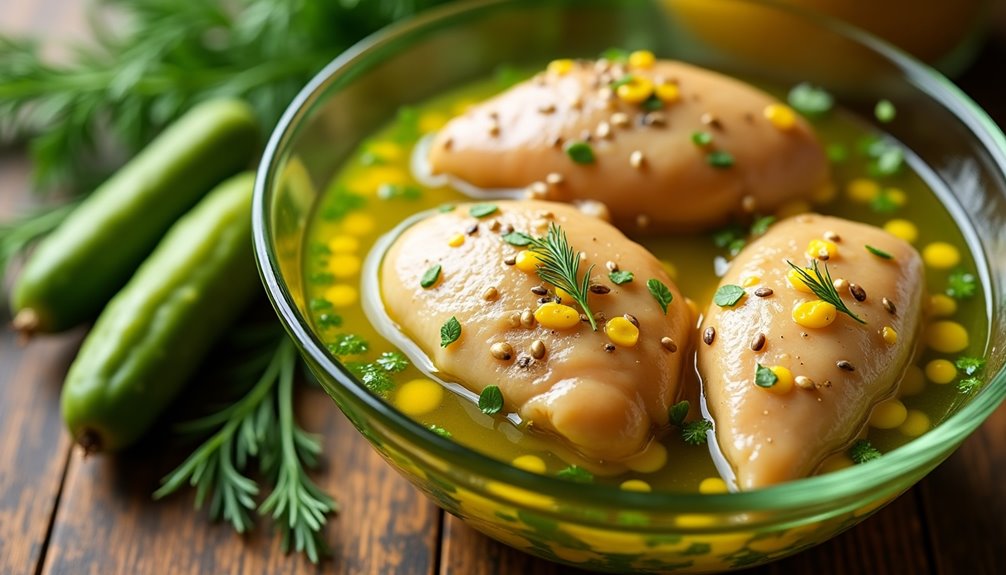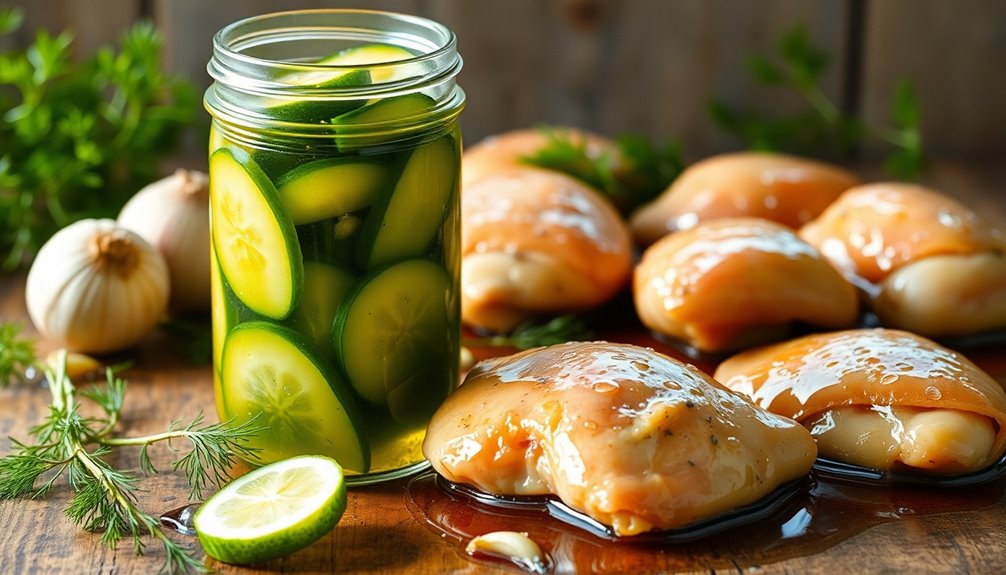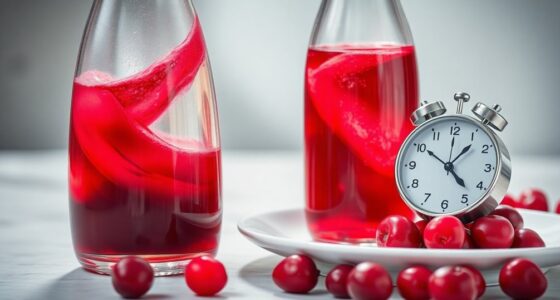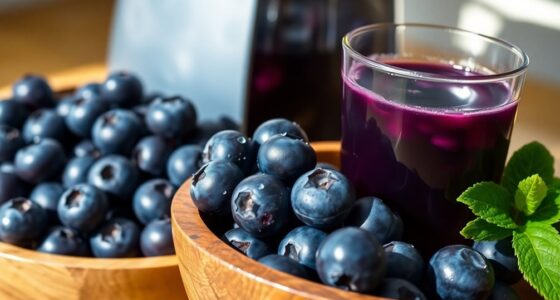You can marinate chicken in pickle juice for about 2 to 24 hours. For smaller cuts like chicken tenders, aim for 2 to 4 hours for the best flavor and texture. Larger cuts, like whole chicken breasts, should marinate for 6 to 8 hours. Make sure to keep the chicken in the refrigerator to prevent bacteria. If you're curious about additional tips and tricks for marinating, there's much more to discover that will enhance your cooking.
Key Takeaways
- Marinate chicken in pickle juice for a minimum of 2 hours for flavor enhancement.
- Maximum marinating time is 24 hours to prevent a mushy texture.
- Smaller cuts like chicken tenders benefit from 2 to 4 hours of marination.
- Larger cuts, such as whole chicken breasts, should marinate for 6 to 8 hours.
- Always marinate chicken in the refrigerator to ensure food safety.

Have you ever wondered how long to marinate chicken in pickle juice for the best flavor? You're not alone. Many home cooks are discovering the incredible taste and tenderness that pickle juice can bring to chicken. The process of marinating chicken in pickle juice isn't just about adding a zesty kick; it's also about achieving the perfect texture and moisture. To get the most out of this unique marinade, you need to know the right timing.
For starters, the minimum of 2 hours is crucial for flavor enhancement. This timeframe allows the acidic components of the pickle juice to penetrate the chicken, breaking down the fibers and ensuring it's tender and flavorful. However, if you're looking for a deeper infusion of taste, you can extend the marinating time. The maximum recommended marinating time is 24 hours; beyond this, the texture may become overly soft, which could leave you with chicken that's mushy instead of juicy.
It's essential to keep your chicken in the refrigerator to prevent bacterial growth during the soaking process. Safety should always come first, and marinating at room temperature can lead to foodborne illnesses. So, make sure you're planning ahead and giving your chicken the time it needs to soak up that delicious pickle flavor while staying safe to eat.
When it comes to marinating times, remember that they can vary based on the cuts of chicken you're using. Smaller pieces, like tenders, generally require less time in the marinade, while larger breasts or thighs may benefit from a longer soak. For instance, if you're using chicken tenders, 2 to 4 hours might be sufficient, but for whole chicken breasts, you might want to aim for at least 6 to 8 hours for optimal flavor.
Once you've finished marinating your chicken, don't forget this important step: pat the chicken dry before cooking. This step is often overlooked but is key to achieving better browning and a crispy exterior. If you cook the chicken straight from the marinade, the excess moisture may prevent it from searing properly, which means you could miss out on that delicious golden crust.
Frequently Asked Questions
Can You Leave Chicken in Pickle Brine Too Long?
Yes, you can leave chicken in pickle brine too long. If you exceed 24 hours, the acid in the pickle juice can make the chicken overly soft or mushy.
You want to strike a balance to ensure your chicken stays tender without losing its texture. It's best to marinate for about 4 to 6 hours for optimal flavor and moisture.
Always refrigerate while marinating to prevent bacterial growth!
How Long Should You Soak Chicken in Pickle Juice?
Soaking chicken in pickle juice is like giving it a tangy spa day. For the best results, aim for 4 to 6 hours. This time frame lets the flavors seep in without turning your chicken into mush.
If you're feeling adventurous, you can push it to 24 hours, but don't go over that—otherwise, you might end up with a texture that's less than appealing.
Always remember to marinate in the fridge for safety!
How Long Can You Marinate Meat in Pickle Juice?
When marinating meat in pickle juice, you can typically let it soak for 1 to 24 hours, depending on the cut.
For thinner cuts, aim for 1 to 4 hours, while thicker cuts can handle up to 24 hours.
Just remember, if you marinate too long, the meat might become mushy due to the acidity.
Always marinate in the refrigerator to keep it safe and flavorful.
Enjoy the tender, zesty results!
Is It Safe to Marinate Chicken for 3 Days?
It's not safe to marinate chicken for 3 days.
While you might think longer marinating enhances flavor, it can actually lead to mushy texture due to the acidity in the brine.
Stick to 2 to 4 hours for the best results.
If you must marinate longer, check the chicken's texture regularly.
Always remember to marinate in the refrigerator to avoid bacteria growth.
Your chicken will taste much better this way!
Conclusion
In just a few hours, you can transform your chicken into a tangy treat with pickle juice. The perfect pickle potion penetrates the poultry, providing a punch of flavor. So, whether you're grilling, baking, or frying, don't shy away from this zesty zest. Just remember, a minimum of two hours and a maximum of overnight will do the trick. Dive into deliciousness with this delightful marinade and savor every succulent bite!
Cindy thoroughly researches juicing trends, techniques, and recipes to provide readers with practical advice and inspiration. Her writing style is accessible, engaging, and designed to make complex concepts easy to understand. Cindy’s dedication to promoting the advantages of juicing shines through her work, empowering readers to make positive changes in their lives through the simple act of juicing.











